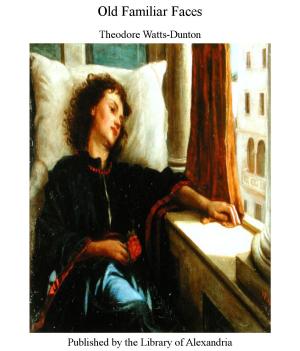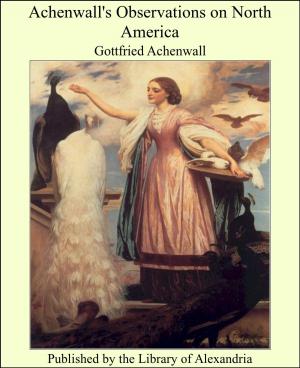| Author: | Lily Dougall | ISBN: | 9781465624413 |
| Publisher: | Library of Alexandria | Publication: | March 8, 2015 |
| Imprint: | Language: | English |
| Author: | Lily Dougall |
| ISBN: | 9781465624413 |
| Publisher: | Library of Alexandria |
| Publication: | March 8, 2015 |
| Imprint: | |
| Language: | English |
'She'll be nearer ninety than eighty, I'm thinking.' There was a moment's pause, which the shop-woman filled with sighs. 'Ye'll be aware that it's a sad house ye're going to. She's verra ill is Mistress Macdonald. It's sorrow for us all, for she's been hale and had her faculties. She'll no' be lasting long now, I'm thinking.' 'No,' said the maid, with good-hearted pensiveness; 'it's not in the course of nature that she should.' She rose as she spoke, as if it behoved her to begin her new duties with alacrity, as there might not long be occasion for them. She put another question before she went. 'And who will there be living in the house now?' 'There's just Miss Macdonald that lives with her mother; and there's Mistress Brown—she'll be coming up most of the days now, but she dinna live there; and there's Ann Johnston, that's helping Miss Macdonald with the nursing—she's been staying at the house for a year back. That's all that there'll be of them besides the servants, except that there's Dr. Robert. His name is Macdonald, too, ye know; he's a nephew, and he's the minister o' the kirk here. He goes up every day to see how his aunt's getting on. I'm thinking he'll be up there now; it's about his time for going.' The maid took the way pointed out to her. Soon she was walking up a gravel path, between trim, old-fashioned laurel hedges. She stood at the door of a detached house. It was an ordinary middle-class dwelling—comfortable, commodious, ugly enough, except that stolidity and age did much to soften its ugliness. It had, above all, the air of being a home—a hospitable open-armed look, as if children had run in and out of it for years, as if young men had gone out from it to see the world and come back again to rest, as if young girls had fluttered about it, confiding their sports and their loves to its ivy-clad walls. Now there hung about it a silence and sobriety that were like the shadows of coming oblivion. The gas was turned low in the hall. The old-fashioned omnibus that came lumbering from the railway with a box for the new maid seemed to startle the place with its noise. In the large dining-room four people were sitting in dreary discussion. The gas-light flared upon heavy mahogany furniture, upon red moreen curtains and big silver trays and dishes. By the fire sat the two daughters of the aged woman. They both had grey hair and wrinkled faces. The married daughter was stout and energetic; the spinster was thin, careworn and nervous. Two middle-aged men were listening to a complaint she made; the one was Robert Macdonald the minister, the other was the family doctor.
'She'll be nearer ninety than eighty, I'm thinking.' There was a moment's pause, which the shop-woman filled with sighs. 'Ye'll be aware that it's a sad house ye're going to. She's verra ill is Mistress Macdonald. It's sorrow for us all, for she's been hale and had her faculties. She'll no' be lasting long now, I'm thinking.' 'No,' said the maid, with good-hearted pensiveness; 'it's not in the course of nature that she should.' She rose as she spoke, as if it behoved her to begin her new duties with alacrity, as there might not long be occasion for them. She put another question before she went. 'And who will there be living in the house now?' 'There's just Miss Macdonald that lives with her mother; and there's Mistress Brown—she'll be coming up most of the days now, but she dinna live there; and there's Ann Johnston, that's helping Miss Macdonald with the nursing—she's been staying at the house for a year back. That's all that there'll be of them besides the servants, except that there's Dr. Robert. His name is Macdonald, too, ye know; he's a nephew, and he's the minister o' the kirk here. He goes up every day to see how his aunt's getting on. I'm thinking he'll be up there now; it's about his time for going.' The maid took the way pointed out to her. Soon she was walking up a gravel path, between trim, old-fashioned laurel hedges. She stood at the door of a detached house. It was an ordinary middle-class dwelling—comfortable, commodious, ugly enough, except that stolidity and age did much to soften its ugliness. It had, above all, the air of being a home—a hospitable open-armed look, as if children had run in and out of it for years, as if young men had gone out from it to see the world and come back again to rest, as if young girls had fluttered about it, confiding their sports and their loves to its ivy-clad walls. Now there hung about it a silence and sobriety that were like the shadows of coming oblivion. The gas was turned low in the hall. The old-fashioned omnibus that came lumbering from the railway with a box for the new maid seemed to startle the place with its noise. In the large dining-room four people were sitting in dreary discussion. The gas-light flared upon heavy mahogany furniture, upon red moreen curtains and big silver trays and dishes. By the fire sat the two daughters of the aged woman. They both had grey hair and wrinkled faces. The married daughter was stout and energetic; the spinster was thin, careworn and nervous. Two middle-aged men were listening to a complaint she made; the one was Robert Macdonald the minister, the other was the family doctor.















